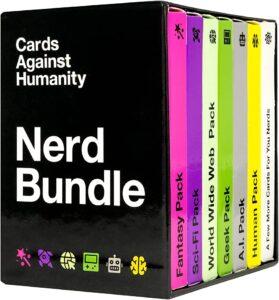Cards Against Humanity was founded by 8 Highland Park School alumni and funded on Kickstarter in 2011. It is a party-genre game and its mechanics are as follows: There are 2 sets of cards – fill in the blank cards and words or phrases cards. Each round a players must place a word or phrase card that they deem is “appropriate” for the fill in the blank card. A defining characteristic of Cards against Humanity is this definition of “appropriate” because oftentimes, pairings are topics and words that are generally inappropriate in day to day conversations. The words and phrases cards are often politically incorrect, heinous, sexual, or offensive. Because of the style of these cards, the box lists the target audience as those 17 and up. Things such as understanding politically incorrect humor or talking about more explicit content makes sense that the maturity rating would be adults. But interestingly, the game likely is popular among a less mature, younger audience – the teenage years of 14-17. The crudeness of the cards thrives off the immaturity of the younger audience. Cards against Humanity has even released extension packs or game variations to satisfy new audiences. For example, there are “family” and “nerd” editions. Regardless of who plays the game, the crudeness of individual cards and along with endless permutations of how they can be combined creates a dynamic of banter, stories, and explanations that in turn creates an aesthetic of fellowship and expression.

The game must be played with a minimum of 3 players but more players better fulfills the fellowship aesthetic of the game. Regardless if the minimum number of players play or the max, the game is still one of expression. More players creates more interesting dynamics between players in the forms of more stories and banter which creates the fellowship type of fun. The game begins with a prompt card being drawn and placed in front of the group. The rest of the players must then submit word/phrase cards for each blank on the prompt card (there is usually one blank but sometimes two). The person who drew the prompt card is then the “judge” that decides which word/phrase card wins. The judge’s choice is subjective to them – there is no mechanic for which word/phrase card wins a round, that is up to the judge. This mechanic in turn creates an interesting dynamic between all players and the judge. Part of the game then becomes knowing your judge and choosing word/phrase cards that you think they would like best. This contributes to the fellowship aesthetic as winning a round comes down to the social interplay between a player and the judge. Whoever wins the round then gets to keep the black prompt card and the first player to 7 of these cards wins the entirety of the game.
The game overall creates a fellowship type fun. The most fun parts of the game come from the conversations, rejections, and laughter that result from the combinations of prompts and phrases. Oftentimes, the game is not played until there is a winner – it is played until the players are tired of the conversations that come as a result of the game. The fellowships forms across all players involved. Whether it’s ridiculing the judge for one of their choices or laughing because of an inside joke one of the cards relates to, Cards against Humanity is a great game for starting conversations and inducing laughter in a group of people. The game also satisfies the expression aesthetic. The mechanic of endless permutations of words and prompts creates a dynamic of creativity and subjective choice in a player. This then gives them the opportunity to express themselves via the word they choose to use on a certain prompt. This is an expression of their humor and choice.
There is a level of vulnerability to the game. In the expression aesthetic, players do express themselves and more specifically, their humor. What one finds funny can be subject to judgment from others – especially with a game like this where types of humor range from politically incorrect to mild corny jokes. The possibility of being ridiculed for something you find funny that others may not makes this game have some element of vulnerability.



